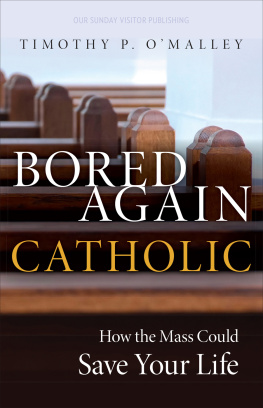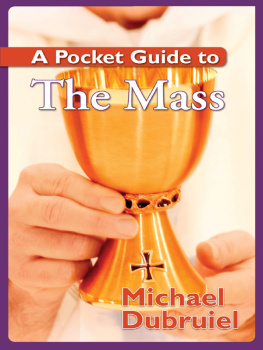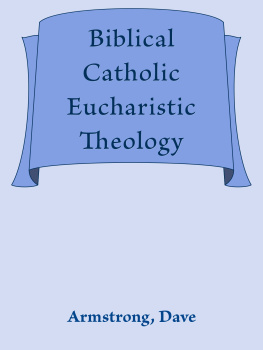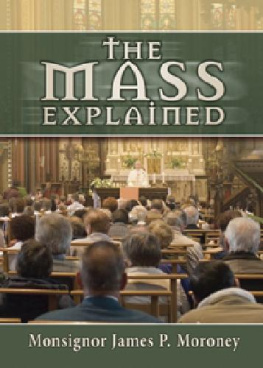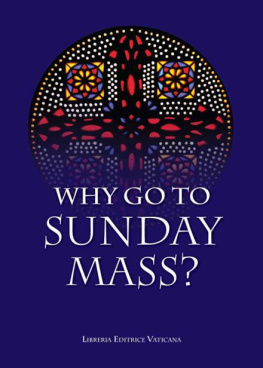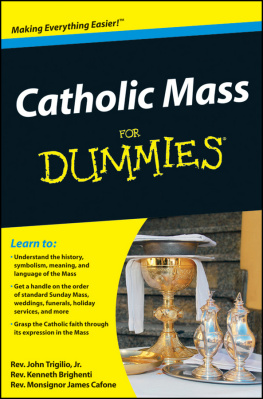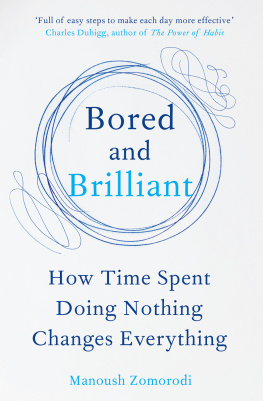
Bored
Again
Catholic
How the Mass Could
Save Your Life
Timothy P. OMalley
Our
Sunday
Visitor
www.osv.com
Our Sunday Visitor Publishing Division
Our Sunday Visitor, Inc.
Huntington, Indiana 46750
Scripture texts used in this work are taken from the New American Bible with Revised New Testament and Psalms, copyright 1991, 1986, 1970 by the Confraternity of Christian Doctrine, Washington, D.C. Used with permission. All rights reserved. No part of the New American Bible may be reproduced by any means without permission in writing from the copyright owner.
English translation of the Catechism of the Catholic Church for use in the United States of America copyright 1994, United States Catholic Conference, Inc.Libreria Editrice Vaticana. English translation of the Catechism of the Catholic Church: Modifications from the Editio Typica copyright 1997, United States Catholic Conference, Inc.Libreria Editrice Vaticana.
Excerpts from the English translation of The Roman Missal 2010, International Commission on English in the Liturgy Corporation (ICEL); excerpts from the English translation of Non-Biblical Readings from The Liturgy of the Hours 1973, 1974, 1975, ICEL. All rights reserved.
Quotations from papal and other Vatican-generated documents available on vatican.va are copyright Libreria Editrice Vaticana.
Every reasonable effort has been made to determine copyright holders of excerpted materials and to secure permissions as needed. If any copyrighted materials have been inadvertently used in this work without proper credit being given in one form or another, please notify Our Sunday Visitor in writing so that future printings of this work may be corrected accordingly.
Copyright 2017 by Timothy P. OMalley. Published 2017.
22 21 20 19 18 17 1 2 3 4 5 6 7 8 9
All rights reserved. With the exception of short excerpts for critical reviews, no part of this work may be reproduced or transmitted in any form or by any means whatsoever without permission from the publisher. For more information, visit: www.osv.com/permissions.
Our Sunday Visitor Publishing Division, Our Sunday Visitor, Inc., 200 Noll Plaza, Huntington, IN 46750; 1-800-348-2440.
ISBN: 978-1-68192-058-0 (Inventory No. T1807)
eISBN: 978-1-68192-063-4
LCCN: 2016952291
Cover design: Lindsey Riesen
Cover art: Shutterstock
Interior image: Shutterstock
P RINTED IN THE U NITED S TATES OF A MERICA
About the Author
Timothy P. OMalley, Ph.D., is director of the Notre Dame Center for Liturgy in the McGrath Institute for Church Life. He teaches in the Department of Theology at the University of Notre Dame. He researches in the areas of liturgy, catechesis, and Christian spirituality. He is the author of Liturgy and the New Evangelization: Practicing the Art of Self-Giving Love (Liturgical Press, 2014). He and his wife, Kara, live in South Bend, Indiana, and have one son.
Contents

Chapter One
In Praise of (Some) Boredom
When I was young, my family went on what seemed like an indeterminable number of road trips through Florida. Constantly approaching boredom, my mind would create ways to entertain itself as we cruised past the swampy landscape of the state. In the morning, the rising sun slowly illuminating the Florida Turnpike provided a welcome distraction. In the afternoon, when the inevitable thunderstorms struck, I watched with wonder as raindrops on the windows expanded and then dissipated. On those rare occasions in which we left the state, I delighted in the changing colors of trees and soil that met us as we passed into the rich clay of southern Georgia. On these road trips, boredom was not something to be avoided at all costs. It was an opportunity to let my mind wander through the delights of creation.
We no longer dwell in an era in which boredom is an occasion for the play of the mind. While on the very same road trips that we endured, our children are occupied by portable DVD players, games available on tablet computers, and devices that are connected to the Internet. And even those of us reared before the dawn of the smart phone are taken in by its siren call to escape boredom at all costs. When boredom rears its humdrum head, we check the latest sports scores or our various social media accounts. We escape into the bliss of constant entertainment and, soon enough, the threat of boredom is eliminated.
What happens, though, when we are no longer bored? What art will no longer be created? What novels will remain unwritten? What scientific theories not be explored? Will young men and women cease imagining what it would be like to fall in love with each other, to create a life together?
While the entire human family should undoubtedly ask these questions, we Catholics should be especially concerned about the disappearance of boredom from our lives. Within the Catholic imagination, boredom is not something that is to be avoided but rather is essential to the spiritual life. The Spiritual Canticle, by St. John of the Cross, was composed as he endured the mind-numbing boredom of being wrongfully locked away in prison, internally composing poetry addressed to the God whose voice he longed to hear. With our growing aversion to boredom, it is possible that we as Catholics are losing the capacity to receive such spiritual insight. Or perhaps, even, to pray at all. Spiritual formation should re-form us to seek anew the saving and sweet gift of boredom.
The Mass is Boring
Our fear of boredom is in fact most perilous to fruitful participation in the Mass. It often seems that what we desire most in the celebration of the Mass is an occasion to be entertained. We want a homilist who can make jokes and tell engaging stories about his life. We want music that is upbeat, a liturgical equivalent to what we listen to while working out at the gym. We want liturgies that are short so that we can resume our busy schedules. Yet in this desire for entertainment we distract ourselves from the contemplative encounter that each celebration of the Mass offers.
Boredom at Mass is not something that should be eliminated. The moment in which we find ourselves bored while listening to the readings and the homily, bored while hearing the same Eucharistic Prayer offered once again, and bored while singing this same hymn we chant every Advent, is also the moment in which we are invited to participate more fully in the love of God poured out in Christ.
To let our minds be distracted by the way that incense fractures the colored light, revealing the beauty of a beautiful God, or to let our imaginations wander during the homily, may be less a matter of frittering away the time and more often a moment in which Gods voice speaks in the stillness of our hearts. To lose our attention during the praying of the Eucharistic Prayer and find ourselves fascinated by the crucifix is not something that should be stopped but is instead our own particular way of participating in the Mass this day. For Catholics, fruitful participation in the Mass requires this ability to let the mind wander and wonder alike.
Our rejection of the state of boredom, therefore, makes it quite possible that full, conscious, and active participation in the Mass is actually made more difficult; for it is saving boredom that gives rise to wondrous contemplation of the Eucharistic love of Christ. Boredom during Mass, in this case, is in fact an invitation to new spiritual growth for the Christian. It is the way God calls us toward a deeper participation in the drama of redemption.
Next page
